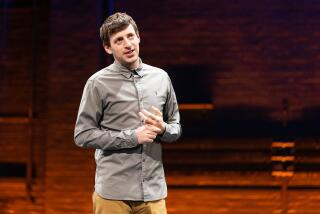Couple’s Faith in Communism Unshaken Despite Change
Three decades after Soviet leader Nikita Khrushchev promised to bury capitalism and the West, the people of Eastern Europe have instead all but put the tombstone over communism’s grave.
The dizzying turn of events in countries such as Czechoslovakia and Hungary, where the word communism has been eradicated from the lexicon, has left American communists such as Art Edelman and his wife, Esther Auerbach, confused and rethinking their beliefs of the past 40 years.
But, while Communist parties are quickly becoming anathema in Eastern Europe, Edelman and Auerbach’s faith in communism remains unshaken. To them, communism is not the anachronism that many critics, including the FBI, say it has become in the United States.
“Very frankly, this has been a confusing period. This is a new experience,” said Edelman, 64, a party member since 1947. “ . . . When our comrades in the United States see what’s taking place in Europe, they have questions and debates. But they have confidence in socialism.”
Edelman and his wife acknowledge some of communism’s failures. But they argue that capitalism itself has failed in the United States. The widening gap between rich and poor, the growing homeless problem, the conservatives’ war against trade unions and other “inherent contradictions” will eventually steer this country to the same reforms that are enveloping Eastern Europe, they say.
In a recent interview in their comfortable, College Area apartment, Edelman and Auerbach spoke candidly about the recent events in Eastern Europe, and how those changes have confirmed or clashed with the ideology they were taught or believed in for several decades.
Lured by the weather, the couple moved to San Diego last year from New York, where they worked at the Communist Party USA’s national headquarters. Their well-furnished home and quick wit are in stark contrast to the picture of the stoic, ascetic agitators that many people may have of communists. While meeting with a reporter, the conversation was briefly interrupted by a UPS delivery man, who was bringing them Christmas packages from relatives on the East Coast.
Aside from the fact that they are communists, Edelman and Auerbach said, they are like most American couples. Because of his East Coast roots, Edelman likes hockey, follows the Boston Bruins and New York Rangers, and counts Frankie Brimsek, a goalie for the Bruins during the 1940s among his heroes. Auerbach, who works in an office, said she likes parties, “not necessarily communist,” and dancing.
Despite being jailed for his beliefs, and harassed by the FBI and the defunct House Un-American Activities Committee, Edelman said, he has never regretted becoming a communist.
Membership in the party subjected him to constant FBI surveillance, Edelman said, which led to frequent job dismissals when agents visited his employers.
In the early 1950s, he was dragged before the activities committee in Pittsburgh, where he lived. On another occasion, he was jailed for eight months for “painting peace signs” in New York. The signs, which were painted in public places, read “Peace No H-Bombs.” Edelman said he viewed those hardships as “the price I paid for being a good American.”
“Communism has helped me be a good American. . . . It’s made me sensitive to working people and taught me values that helped me fight against racism,” he said.
Auerbach, who was a “red diaper baby,” meaning she was the child of communists, joined the party in 1962, but her elderly parents have been members most of their adult lives. Auerbach, 47, said the move for democracy in Eastern Europe was a natural one and part of communism’s evolutionary process. But she also was surprised by its suddenness.
But does the democratic movement overseas mean communism has been a failure? Was communism in fact already failing when Khrushchev issued his threat to the West? Do the events in Eastern Europe prove that communists, including Edelman and Auerbach, have been wrong for 40 years?
The American couple say the answer to those and similar questions is yes, and no. While acknowledging that mistakes were made by communist leaders in the past, they said that the errors were understandable and, in some cases, expected.
Edelman, a retired carpenter and World War II Navy veteran, said communism’s hard line of the past was prompted by the U.S. policy of containment during the Cold War. He credited Soviet leader Mikhail Gorbachev and “Gorbymania” for laying the groundwork for democracy in Europe and the world, including the United States.
“The movement for peace in the world has been led by Gorbymania,” Edelman said. “These are the ideas that are moving Europe and the world today. Some leaders, communist and non-communist, are unable to grasp these new concepts. . . . The cultural exchange (between San Diego and the Soviet Union) proves that people in San Diego and the United States want peace and friendship with the Soviets.”
Instead of rejecting communism, Auerbach argued that the reform movement in communist countries is nothing less than “a continuation of socialism and furthering of democracy.”
As to arguments that Gorbachev’s reforms prove that communism has been a failure, he said:
“Gorbachev says exactly the opposite. He says that the history of the Soviet Union is a glorious history, and the history of socialism is a feat unparalleled in the world.”
Auerbach believes that the United States will eventually end up in the path of the current reform movement.
“Capitalism is not serving the needs of the people. . . . My concern is that democracy needs to be improved here,” she said. “I believe that socialism is the way to do this. Socialism, with whatever flaws it has, can do these things better.”
Throughout their meeting with a reporter, Edelman and Auerbach never talked about the proletariat or bourgeoisie, familiar communist buzzwords denoting the workers and the capitalists. Their continual promotion of socialism provided the only hint of the uncompromising dogma endorsed by the party in the United States for more than half a century.
Today, communists endorse and actively support “progressive” candidates when party members are not on the ballot.
“We can’t influence the policies and events in Eastern Europe,” Edelman said. “But we can influence what’s happening in the United States. . . . It’s perfectly logical that we support progressive candidates, even if they aren’t communists.”
Auerbach and Edelman scoffed at the prevailing view of non-communists that U.S. communists take their orders from Moscow and are disloyal Americans.
“We view problems in the U.S. from our perspective as Americans,” she said. “Nobody gives us marching orders. Each country, including the U.S., will travel the road to socialism based on its own tradition.”
“All communists, no matter where they live, are loyal to their country,” said Edelman, whose first wife was also a communist. “If any nation--any nation--were to threaten the U.S., I would defend my country, just like I did in World War II.”
That the pair ended up as communists is hardly surprising. Edelman’s family came from the Ukraine. While he was growing up in Queens, New York, his father was “an old socialist.” Eventually, another brother and sister joined the Communist Party. But Edelman himself was a rabid anti-communist while he was in the Navy, he said.
“I was young and influenced by the government’s campaign against communists. I too ridiculed them for being bomb-throwing anarchists. I hated them,” Edelman said.
Auerbach, also a New York native, was an only child, and her communist parents live in New Jersey. While she was growing up, her parents made it a policy to always live in integrated neighborhoods, she said.
“I’m a red-diaper baby. But just because my parents were communists didn’t automatically make me a communist. . . . I had very little interest in communism until 1962, when we were confronted by the Cuban missile crisis and the threat of nuclear war,” she said.
Auerbach’s two sons are party members, but none of Edelman’s four children joined the party.
“I’m sorry to say they are not communists, but they are not reactionaries, either,” he said. “Well, they’re Democrats.”
More to Read
Sign up for Essential California
The most important California stories and recommendations in your inbox every morning.
You may occasionally receive promotional content from the Los Angeles Times.










